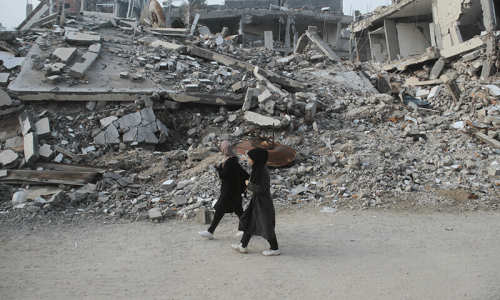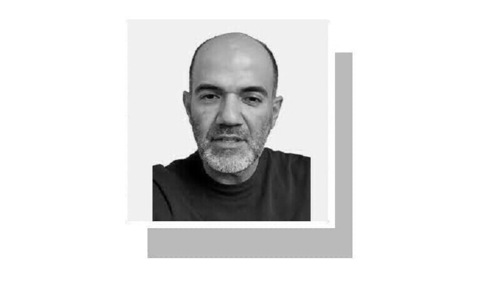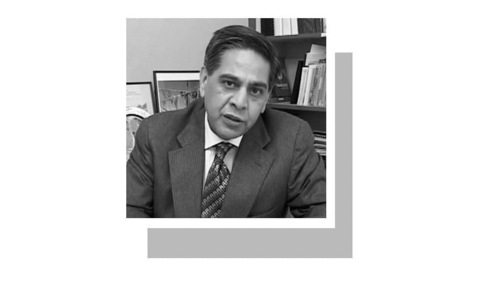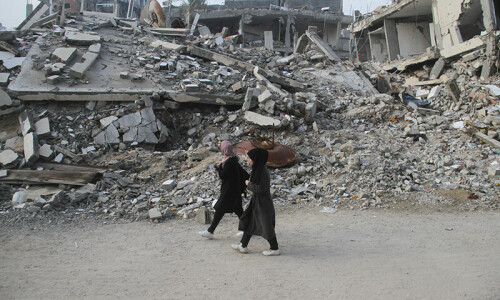 KARACHI: Named after the oldest industrial area of Pakistan with over 2,500 manufacturing units, Site Town is home to members of nearly all communities of the country.
KARACHI: Named after the oldest industrial area of Pakistan with over 2,500 manufacturing units, Site Town is home to members of nearly all communities of the country.
Spread over 50 square kilometres, the site town nazim failed to find favour with the Karachi nazim, Niamatullah Khan, and says his town faced a shortage of funds for the first two years as money was generously given to towns headed by nazims supported by the Jamaat-i-Islami.
Funds started to trickle in only after the installation of the provincial government in 2002. The total outlay of the town’s budget last year was Rs 450 million.
According to the 1998 census, Site town’s population was 467,560. If it is assumed that the population grew at 1.9 per cent — a figure quoted by the latest Economic Survey of Pakistan — its current population would be over 530,000.
This figure, however, does not take into account those who regularly come to Site looking for work. In addition to being the largest industrial zone in the country, the town also boasts the largest marble market in South Asia and the city’s biggest market of second-hand spare parts.
Though people from the Frontier dominate the town’s ethnic complexion, other nationalities living in Site include Baloch, Punjabis, Sindhis, Urdu-speakers, Brohis, Niazis and Hazaras.
In the 2001 elections, the Khidmatgar group, supported by the Awami National Party, had teamed up with the Awam Dost group, backed by the Pakistan People’s Party, and they managed to win the post of town nazim.
Ameer Nawab had obtained 106 votes whereas his opponent, Hameedullah advocate, who had the backing of the Jamaat-i- Islami’s Al-Khidmat group, had got 70 votes. (Mr Hameedullah was subsequently elected a member of the Sindh Assembly on the Jamaat ticket.) Mohammad Ahmad Baloch, who was supported by the Awam Dost group, became naib nazim.
At least 54 per cent of the town’s electorate cast their votes in 2001. There are around 201, 702 voters - including 125,325 men and 76,377 women. At least 129 polling stations have been set up in the town.
Analysts say that the Muttahida Qaumi Movement’s participation in the forthcoming elections is not likely to have a major impact on the election results in this town. While the party holds complete sway over two of the nine union councils of the town, it is not likely to make inroads in the vote bank currently commanded by the Awami National Party and the Muttahida Majlis-i-Amal, both of which count on Pathan voters.
The Pakistan People’s Party also has a considerable following in the area.
Akhlaq-un-Nabi was elected nazim of the Pak Colony union council in the 2001 elections. Supported by the Jamiat Ulema-i- Pakistan (Al-Madina panel), he is not seeking re-election. Though the Jamaat-i-Islami has forged an alliance with the Ahle Sunnat party in the constituency, analysts hold that the MQM is likely to get its candidate elected from the Pak Colony union council, which has a sizeable population of Urdu-speakers. The localities which constitute the union council are Pak Colony, Hasrat Mohani Colony, Site, Labour Colony, Site Polytechnic Colony, Asif Colony and Yaseen Zubairi Colony. At least five councillors have already been elected unopposed in the union council.
Supported by the Awam Dost panel, Sher Mohammad had won the post of nazim in the Old Golimar union council in the 2001 elections. The Baloch outnumber other nationalities living in this union council, which has Old Golimar, Qadeemi Mohalla, Ghulam Muhammad Village, Bara Para, Central Muslimabad, Khawaja Gharib Nawaz Colony, Misri Khan Village, and Chittagong Colony. In addition to the Awam Dost panel, other groups in the fray are the Haq Parast panel and the Shaheed Bhutto group.
Mir Talib Hussain Brohi was elected nazim of the Jahanabad union council in 2001. He was also supported by the Awam Dost panel. In addition to Balochis, other nationalities living in the union council include Hazaras, Niazis, Chachis and Brohis. The localities which fall under the union council include Jahanabad, Shershah Village, Mianwali Village, Hassan Oliya Village, Rexor Colony, United Colony and Haroonabad.
Abdul Razzaq, who won the Metroville union council in 2001, belongs to the Al-Khidmat group. He managed to obtain huge funds for his area on account of his association with the Jamaat-i- Islami. A Rs 40.5 million for girls’ college project was initiated and completed within his tenure. Several model parks were also built by him. The Pathans dominate the ethnic makeup of the union council, which has Metroville 1, 2, 3 and 4, Metroville-Site, Mominabad, Labour Colony and Site area. Other nationalities in the area include Hazaras, Punjabis, Sindhis and Aga Khanis. The political groups in the fray are Al-Khidmat, Awam Dost and Khidmatgar (ANP and MQM).
In 2001, Malikzada Khan had won the post of the nazim of the Pathan Colony union council. He was supported by the Awami National Party. Pathan constituents in the union council are supporters of the ANP and the MMA. Other parties fielding their candidates in the union council are the Jamaat-i-Islami and Tehrik-i-Insaf. Bawani Challi and Pathan Colony are two localities in the union council. At least one councillor has been elected unopposed.
Siddiq Akbar of the Qasba Colony union council won the post of nazim in 2001. Supported by the Awam Dost panel, he had teamed up with the Al-Khidmat group. Since the number of Urdu-speakers and Pathans in the union council is almost equal, analysts maintain that the Haq Parast panel might succeed in getting its candidate elected from the union council, which has Qasba Colony, Muslimabad, Peerabad and Mohammad Pur. At least one councillor has been elected unopposed.
Dr Ziauddin Ahmad, who had the support of the Khidmatgar group, won the post of nazim of the Frontier Colony union council in 2001. The two influential parties of the area — the PPP and the ANP — have fielded their candidates in the union council, which has Frontier Colony and Orangi Sectors 4 and 5.
Backed by the Al-Khidmat group, Maulvi Mohammad was elected nazim in the Banaras Colony union council. When he was removed from his post because of the degree issue, his post was occupied by Mohammad Ishaq of the same political party following a by-election. The Jamaat-i-Islami has made no alliance with any political party and is seeking to re-occupy the union council, which includes Frontier Colony No. 2, Banaras Colony and Frontier Colony No. 1.
Saifullah Niazi was elected nazim in the Islamia Colony union council in the 2001 elections. The localities which fall under his union council include Islamia Colony, New Mianwali Colony, Nusrat Colony and Iqbal Colony. The PPP and the JUI have fielded candidates in the union council.
Police officials maintain that the notorious Arshad Pappu, who wielded considerable clout in the Jahanabad union council, will not be able to affect the polling process on Aug 18. They say that all the three police stations in the town — Peerabad, Pak Colony and Site police stations — have been alerted. They point out that out of the 129 polling stations in the town, 38 have been designated as most sensitive.












































Dear visitor, the comments section is undergoing an overhaul and will return soon.